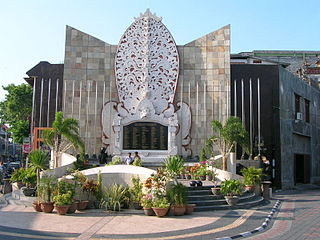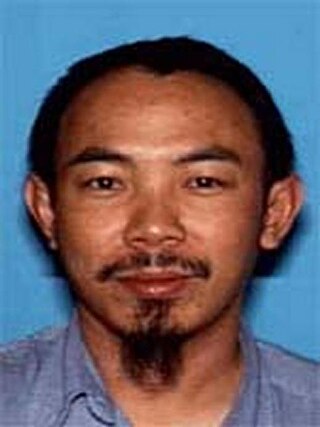Related Research Articles

The 2002 Bali bombings occurred on 12 October 2002 in the tourist district of Kuta on the Indonesian island of Bali. The attack killed 202 people. A further 209 people were injured.
Jemaah Islamiyah is a Southeast Asian militant extremist Islamist terrorist group based in Indonesia, which is dedicated to the establishment of an Islamic state in Southeast Asia. On 25 October 2002, immediately following the JI-perpetrated Bali bombing, JI was added to the UN Security Council Resolution 1267 as a terrorist group linked to Al-Qaeda or the Taliban.

Ali Amrozi bin Haji Nurhasyim was an Indonesian terrorist who was convicted and executed for his role in carrying out the Christmas Eve 2000 Indonesia bombings and 2002 Bali bombings. Amrozi was the brother of Huda bin Abdul Haq, also known as Muklas, who coordinated the bombing attack. Amrozi was executed together with Muklas and their co-conspirator, Imam Samudra.

The Singapore embassies attack plot was a plan in 2001 by Jemaah Islamiyah (JI) to bomb the diplomatic missions and attack personnel of the United States, Australia, the United Kingdom, and Israel based in Singapore. There were also several other targets. The plot was uncovered in December 2001 and as many as 15 people were arrested in Singapore within a month. Further investigation and intelligence prompted the detention of another 26 persons from 2002 to 2005. As of 2006, 37 of them were still being detained without trial, under the Internal Security Act. Four had been released on restriction orders.

Abu Bakar Ba'asyir also known as Abu Bakar Bashir, Abdus Somad, and Ustad Abu is an Indonesian Muslim cleric and leader of Jamaah Ansharut Tauhid.

The Australian embassy bombing in Jakarta took place on September 9, 2004 in Indonesia.
Jack Roche is an Australian convicted on a charge of conspiring to commit an offence provided for by the Crimes Act 1976 to destroy an internationally protected building, the Israeli Embassy in Canberra, Australia.

The 2005 Bali bombings were a series of terrorist suicide bomb and a series of car bombs and attacks that occurred on 1 October 2005, in Bali, Indonesia. Bombs exploded at two sites in Jimbaran Beach Resort and in Kuta 30 km (19 mi) away, both in south Bali. The terrorist attack claimed the lives of 20 people and injured more than 100 others. The three bombers also died in the attacks.
The 2003 Marriott Hotel bombing occurred on August 5, 2003 in Mega Kuningan, South Jakarta, Indonesia. A suicide bomber detonated a car bomb outside the lobby of the JW Marriott Hotel, killing 12 people and injuring 150. Those killed including a white Dutch man while the rest were Indonesian. The hotel was viewed as a Western symbol, and had been used by the United States embassy for various events. The hotel was closed for five weeks and reopened to the public on September 8.

Noordin Mohammad Top was a Malaysian Muslim extremist. He was also referred to as Noordin, Din Moch Top, Muh Top, Top M or Mat Top. Until his death, he was Indonesia's most wanted Islamist militant.

Dulmatin was a senior figure in the militant Islamic group Jemaah Islamiyah (JI) and one of the most wanted terrorists in Southeast Asia. He was also known as Amar Usmanan, Joko Pitoyo, Joko Pitono, Abdul Matin, Pitono, Muktarmar, Djoko, and Noval. He also had the nickname "Genius". Dulmatin was an ethnic Javanese with a height of 172 cm, weighing 70 kg, with a brown complexion.
Umar Patek is an Indonesian convicted terrorist and member of Jemaah Islamiyah who was wanted in the United States, Australia, and Indonesia on terrorism charges. There was a US$1 million reward offered by the Rewards For Justice Program for information leading to his capture. In June 2012, Patek was convicted for his involvement in the 2002 bombings in Bali, Indonesia, which killed 202 people. On December 7th, 2022, Patek was released from prison.

Imam Samudra, also known as Abdul Aziz, Qudama/Kudama, Fatih/Fat, Abu Umar or Heri, was an Indonesian terrorist who was convicted and executed for his role in carrying out the Christmas Eve 2000 Indonesia bombings and 2002 Bali bombings. Samudra, together with Huda bin Abdul Haq and Amrozi bin Nurhasyim were executed together for their part in coordinating and carrying out the Bali bombings.

Terrorism in Indonesia refer to acts of terrorism that take place within Indonesia or attacks on Indonesian people or interests abroad. These acts of terrorism often target the government of Indonesia or foreigners in Indonesia, most notably Western visitors, especially those from the United States and Australia.
The Al-Mukmin Islamic boarding school also known as Pesantren Al-Mukmin and Pondok Ngruki, is a pesantren located in Ngruki, a suburb in the city of Surakarta, Central Java, Indonesia. It was founded 1972 by the alleged 'spiritual head' of Jemaah Islamiyah, Abu Bakar Bashir, and by Abdullah Sungkar. Al-Mukmin's activities were initially limited to religious discussion after dhuhr. Following increasing interest, the founders expanded Al-Mukmin into a madrasah and then into a pesantren. It currently houses over 2000 students aged between 12 and 18.

Huda bin Abdul Haq was an Indonesian terrorist who was convicted and executed for his role in coordinating the Christmas Eve 2000 Indonesia bombings and 2002 Bali bombings. Mukhlas was a senior and influential Jemaah Islamiah leader with ties to Osama bin Laden.
Joni Hendrawan, also known as Idris, is an Indonesian, who after escaping conviction for his role in the 2002 Bali Bombing, was convicted for the 2003 Marriott Hotel bombing.

Zulkifli Abdhir was a Malaysian who was one of the FBI Most Wanted Terrorists. The American Federal Bureau of Investigation (FBI) agency offered a US$5 million reward for information leading to his capture. He was the maker of bombs delivered for usage to several terrorist groups. He was often referred to by the nom de guerreMarwan. He was suspected of leading the Kumpulan Mujahidin Malaysia (KMM), being part of the central command of the Jemaah Islamiyah (JI), and of involvement in the 2002 Bali bombings. He was suspected of hiding in Mindanao under the protection of the Bangsamoro Islamic Freedom Fighters.

The National Counter Terrorism Agency is an Indonesian non-ministerial government department that works to prevent terrorism. BNPT is headed by a chief, who is responsible to the President. When it was first launched, the leader of BNPT held the ranking of a civil servant but the Presidential Regulation in 2012 elevated the post of BNPT Chief to the ministerial level.
The 2002 bombings in Makassar, Indonesia occurred on December 5, 2002, where a bomb exploded within inner-city McDonald's restaurant. The McDonald’s restaurant was located in the Ratu Indah shopping mall, in Makassar. These bomb actions were conducted by the Islamic group “Laskar Jundullah”, which caused death to 3 people, including the bomber himself, and injured 15 others. The leader of the group, Agung Abdul Hamid, received a jail sentence of 18 years due to the planning and execution of both the bomb and the attack in Makassar. There is police confirmation that the Islamic group, behind the McDonald's attack in Makassar, was Laskar Jundullah Islamic Militia, where many of their beliefs and values reflect and stem from those of The 'Jamaah Islamiyah' Islamic Group.
References
- 1 2 3 Butt, Simon; Hansell, David. (2004). The Masykur Abdul Kadir Case: Indonesian Constitutional Court Decision No 013/PUU-I/2003* * URL: https://www.federationpress.com.au/pdf/AJAL6(2)%20Butt.pdf
- 1 2 Harding, Andrew; Nicholson, Penelope (2010-01-21). New Courts in Asia. Routledge. ISBN 9781135182724.
- ↑ "Indonesian militants to 'apologise' for Bali bombings". The Sydney Morning Herald. 2018-02-26. Retrieved 2018-11-02.
- ↑ "Indonesia brings convicted militants and victims together". Daily Herald. Associated Press. 2018-02-26. Retrieved 2018-11-02.